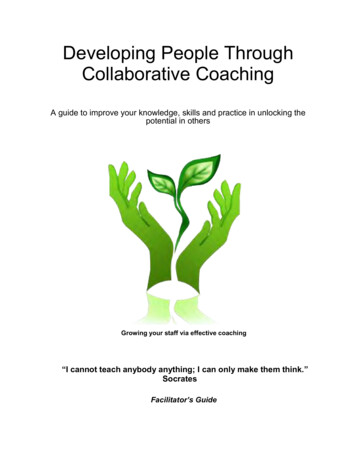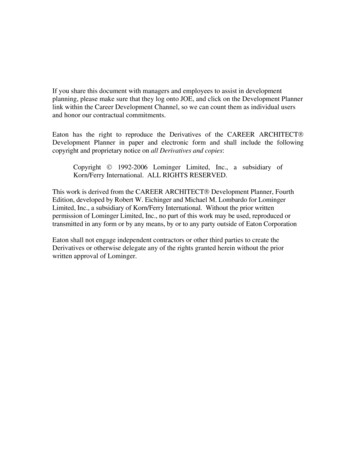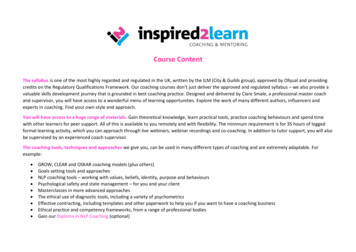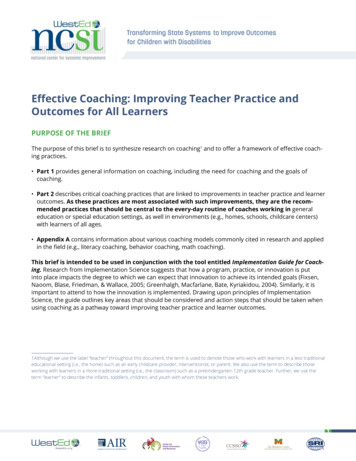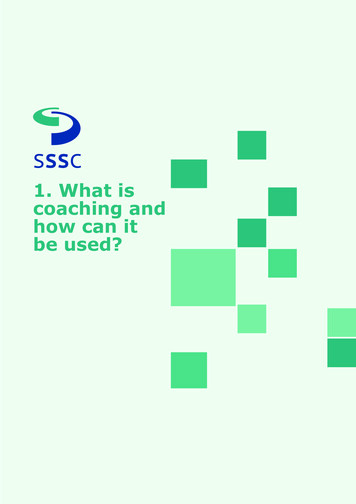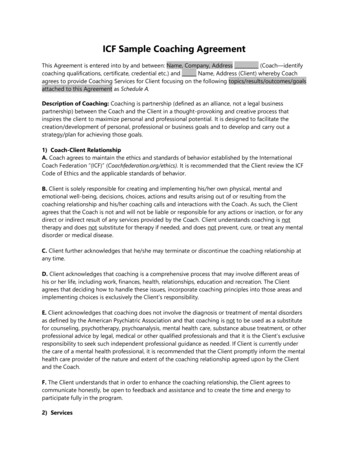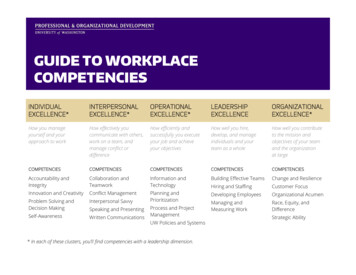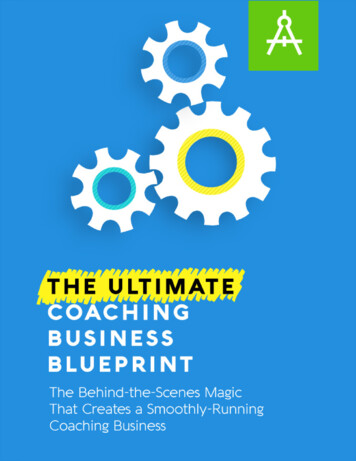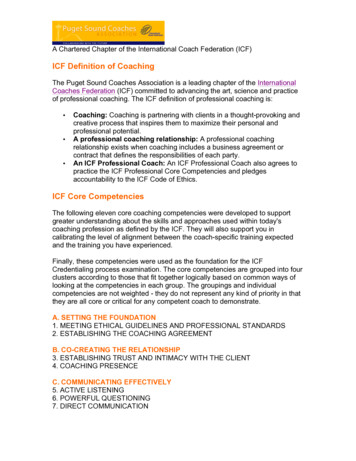
Transcription
A Chartered Chapter of the International Coach Federation (ICF)ICF Definition of CoachingThe Puget Sound Coaches Association is a leading chapter of the InternationalCoaches Federation (ICF) committed to advancing the art, science and practiceof professional coaching. The ICF definition of professional coaching is: Coaching: Coaching is partnering with clients in a thought-provoking andcreative process that inspires them to maximize their personal andprofessional potential.A professional coaching relationship: A professional coachingrelationship exists when coaching includes a business agreement orcontract that defines the responsibilities of each party.An ICF Professional Coach: An ICF Professional Coach also agrees topractice the ICF Professional Core Competencies and pledgesaccountability to the ICF Code of Ethics.ICF Core CompetenciesThe following eleven core coaching competencies were developed to supportgreater understanding about the skills and approaches used within today'scoaching profession as defined by the ICF. They will also support you incalibrating the level of alignment between the coach-specific training expectedand the training you have experienced.Finally, these competencies were used as the foundation for the ICFCredentialing process examination. The core competencies are grouped into fourclusters according to those that fit together logically based on common ways oflooking at the competencies in each group. The groupings and individualcompetencies are not weighted - they do not represent any kind of priority in thatthey are all core or critical for any competent coach to demonstrate.A. SETTING THE FOUNDATION1. MEETING ETHICAL GUIDELINES AND PROFESSIONAL STANDARDS2. ESTABLISHING THE COACHING AGREEMENTB. CO-CREATING THE RELATIONSHIP3. ESTABLISHING TRUST AND INTIMACY WITH THE CLIENT4. COACHING PRESENCEC. COMMUNICATING EFFECTIVELY5. ACTIVE LISTENING6. POWERFUL QUESTIONING7. DIRECT COMMUNICATION
A Chartered Chapter of the International Coach Federation (ICF)D. FACILITATING LEARNING AND RESULTS8. CREATING AWARENESS9. DESIGNING ACTIONS10. PLANNING AND GOAL SETTING11. MANAGING PROGRESS AND ACCOUNTABILITYA. SETTING THE FOUNDATION1. Meeting Ethical Guidelines and Professional Standards - Understanding ofcoaching ethics and standards and ability to apply them appropriately in allcoaching situations.1. Understands and exhibits in own behaviors the ICF Standards of Conduct(see list, Part III of ICF Code of Ethics),2. Understands and follows all ICF Ethical Guidelines (see list),3. Clearly communicates the distinctions between coaching, consulting,psychotherapy and other support professions,4. Refers client to another support professional as needed, knowing whenthis is needed and the available resources.2. Establishing the Coaching Agreement - Ability to understand what isrequired in the specific coaching interaction and to come to agreement with theprospective and new client about the coaching process and relationship.1. Understands and effectively discusses with the client the guidelines andspecific parameters of the coaching relationship (e.g., logistics, fees,scheduling, inclusion of others if appropriate),2. Reaches agreement about what is appropriate in the relationship and whatis not, what is and is not being offered, and about the client's and coach'sresponsibilities,3. Determines whether there is an effective match between his/her coachingmethod and the needs of the prospective client.B. CO-CREATING THE RELATIONSHIP3. Establishing Trust and Intimacy with the Client - Ability to create a safe,supportive environment that produces ongoing mutual respect and trust.1.2.3.4.Shows genuine concern for the client's welfare and future,Continuously demonstrates personal integrity, honesty and sincerity,Establishes clear agreements and keeps promises,Demonstrates respect for client's perceptions, learning style, personalbeing,
A Chartered Chapter of the International Coach Federation (ICF)5. Provides ongoing support for and champions new behaviors and actions,including those involving risk taking and fear of failure,6. Asks permission to coach client in sensitive, new areas.4. Coaching Presence - Ability to be fully conscious and create spontaneousrelationship with the client, employing a style that is open, flexible and confident.1. Is present and flexible during the coaching process, dancing in themoment,2. Accesses own intuition and trusts one's inner knowing - "goes with thegut",3. Is open to not knowing and takes risks,4. Sees many ways to work with the client, and chooses in the moment whatis most effective,5. Uses humor effectively to create lightness and energy,6. Confidently shifts perspectives and experiments with new possibilities forown action,7. Demonstrates confidence in working with strong emotions, and can selfmanage and not be overpowered or enmeshed by client's emotions.C. COMMUNICATING EFFECTIVELY5. Active Listening - Ability to focus completely on what the client is saying andis not saying, to understand the meaning of what is said in the context of theclient's desires, and to support client self-expression.1. Attends to the client and the client's agenda, and not to the coach'sagenda for the client,2. Hears the client's concerns, goals, values and beliefs about what is and isnot possible,3. Distinguishes between the words, the tone of voice, and the bodylanguage,4. Summarizes, paraphrases, reiterates, mirrors back what client has said toensure clarity and understanding,5. Encourages, accepts, explores and reinforces the client's expression offeelings, perceptions, concerns, beliefs, suggestions, etc.,6. Integrates and builds on client's ideas and suggestions,7. "Bottom-lines" or understands the essence of the client's communicationand helps the client get there rather than engaging in long descriptivestories,8. Allows the client to vent or "clear" the situation without judgment orattachment in order to move on to next steps.
A Chartered Chapter of the International Coach Federation (ICF)6. Powerful Questioning - Ability to ask questions that reveal the informationneeded for maximum benefit to the coaching relationship and the client.1. Asks questions that reflect active listening and an understanding of theclient's perspective,2. Asks questions that evoke discovery, insight, commitment or action (e.g.,those that challenge the client's assumptions),3. Asks open-ended questions that create greater clarity, possibility or newlearning4. Asks questions that move the client towards what they desire, notquestions that ask for the client to justify or look backwards.7. Direct Communication - Ability to communicate effectively during coachingsessions, and to use language that has the greatest positive impact on the client.1. Is clear, articulate and direct in sharing and providing feedback,2. Reframes and articulates to help the client understand from anotherperspective what he/she wants or is uncertain about,3. Clearly states coaching objectives, meeting agenda, purpose oftechniques or exercises,4. Uses language appropriate and respectful to the client (e.g., non-sexist,non-racist, non-technical, non-jargon),5. Uses metaphor and analogy to help to illustrate a point or paint a verbalpicture.D. FACILITATING LEARNING AND RESULTS8. Creating Awareness - Ability to integrate and accurately evaluate multiplesources of information, and to make interpretations that help the client to gainawareness and thereby achieve agreed-upon results.1. Goes beyond what is said in assessing client's concerns, not gettinghooked by the client's description,2. Invokes inquiry for greater understanding, awareness and clarity,3. Identifies for the client his/her underlying concerns, typical and fixed waysof perceiving himself/herself and the world, differences between the factsand the interpretation, disparities between thoughts, feelings and action,4. Helps clients to discover for themselves the new thoughts, beliefs,perceptions, emotions, moods, etc. that strengthen their ability to takeaction and achieve what is important to them,5. Communicates broader perspectives to clients and inspires commitmentto shift their viewpoints and find new possibilities for action,6. Helps clients to see the different, interrelated factors that affect them andtheir behaviors (e.g., thoughts, emotions, body, background),
A Chartered Chapter of the International Coach Federation (ICF)7. Expresses insights to clients in ways that are useful and meaningful forthe client,8. Identifies major strengths vs. major areas for learning and growth, andwhat is most important to address during coaching,9. Asks the client to distinguish between trivial and significant issues,situational vs. recurring behaviors, when detecting a separation betweenwhat is being stated and what is being done.9. Designing Actions - Ability to create with the client opportunities for ongoinglearning, during coaching and in work/life situations, and for taking new actionsthat will most effectively lead to agreed-upon coaching results.1. Brainstorms and assists the client to define actions that will enable theclient to demonstrate, practice and deepen new learning,2. Helps the client to focus on and systematically explore specific concernsand opportunities that are central to agreed-upon coaching goals,3. Engages the client to explore alternative ideas and solutions, to evaluateoptions, and to make related decisions,4. Promotes active experimentation and self-discovery, where the clientapplies what has been discussed and learned during sessionsimmediately afterwards in his/her work or life setting,5. Celebrates client successes and capabilities for future growth,6. Challenges client's assumptions and perspectives to provoke new ideasand find new possibilities for action,7. Advocates or brings forward points of view that are aligned with clientgoals and, without attachment, engages the client to consider them,8. Helps the client "Do It Now" during the coaching session, providingimmediate support,9. Encourages stretches and challenges but also a comfortable pace oflearning.10. Planning and Goal Setting - Ability to develop and maintain an effectivecoaching plan with the client.1. Consolidates collected information and establishes a coaching plan anddevelopment goals with the client that address concerns and major areasfor learning and development,2. Creates a plan with results that are attainable, measurable, specific andhave target dates,3. Makes plan adjustments as warranted by the coaching process and bychanges in the situation,4. Helps the client identify and access different resources for learning (e.g.,books, other professionals),5. Identifies and targets early successes that are important to the client.
A Chartered Chapter of the International Coach Federation (ICF)11. Managing Progress and Accountability - Ability to hold attention on what isimportant for the client, and to leave responsibility with the client to take action.1. Clearly requests of the client actions that will move the client toward theirstated goals,2. Demonstrates follow through by asking the client about those actions thatthe client committed to during the previous session(s),3. Acknowledges the client for what they have done, not done, learned orbecome aware of since the previous coaching session(s),4. Effectively prepares, organizes and reviews with client informationobtained during sessions,5. Keeps the client on track between sessions by holding attention on thecoaching plan and outcomes, agreed-upon courses of action, and topicsfor future session(s),6. Focuses on the coaching plan but is also open to adjusting behaviors andactions based on the coaching process and shifts in direction duringsessions,7. Is able to move back and forth between the big picture of where the clientis heading, setting a context for what is being discussed and where theclient wishes to go,8. Promotes client's self-discipline and holds the client accountable for whatthey say they are going to do, for the results of an intended action, or for aspecific plan with related time frames,9. Develops the client's ability to make decisions, address key concerns, anddevelop himself/herself (to get feedback, to determine priorities and setthe pace of learning, to reflect on and learn from experiences),10. Positively confronts the client with the fact that he/she did not take agreedupon actions.
learning, during coaching and in work/life situations, and for taking new actions that will most effectively lead to agreed-upon coaching results. 1. Brainstorms and assists the client to define actions that will enable the cl
